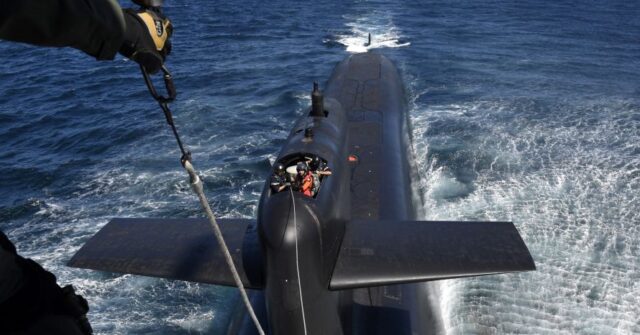France will co-ordinate its nuclear weapons with a foreign power for the first time under a new agreement with the United Kingdom expressed as a bid to deter “extreme threats” against Europe.
A new nuclear agreement has been reached between the United Kingdom and France, it was announced this week as France’s President Macron was hosted in London for a state visit. Per statements by both governments, the neighbouring nations agree that no nuclear threat to one could possibly not impact the other, so coordination of their nuclear weapons will help the pair protect the “Euro Atlantic area” from threats.
Under the deal both nuclear deterrents will remain independent, but will be subjected to as-of-yet unspecified coordination. The UK government said: “any adversary threatening the vital interests of Britain or France could be confronted by the strength of the nuclear forces of both nations”.
London noted in a statement: “Our nuclear weapons exist to deter the most extreme threats to the security of our nations and our vital interests. Our nuclear forces are independent, but can be coordinated and contribute significantly to the overall security of the Alliance, and to the peace and stability of the Euro Atlantic area.”
To facilitate this, “a UK-France Nuclear Steering Group will be established to provide political direction for this work”. The body “will coordinate across nuclear policy, capabilities and operations.”
The announcement is particularly remarkable for its potential influence on French nuclear doctrine. While the United Kingdom works with the United States on nuclear weapons, is a member of NATO’s nuclear group, and is to soon join NATO the nuclear-sharing mission to carry American warheads on British planes, France’s nuclear deterrent has always been fiercely independent. Unlike Britain, all of France’s nuclear weapons and launch systems are developed and built in France, albeit with some American technical assistance.
The Financial Times cites the words of King’s College London Professor of War Studies Sir Lawrence Freedman who noted of the impact on the Anglo-French declaration on Paris’s nukes: “As far as I know, the French have never admitted publicly that they co-ordinate nuclear capabilities with anybody else, so that in itself is quite an important development.” The paper relates he stated one relatively low-impact area of cooperation between the UK and France could be co-ordinating when their respective nuclear submarines are in refit, to make sure capability gaps don’t inadvertently align.
Compared to the United States or Russia, both France and the United Kingdom have small but meaningful stockpiles of nuclear weapons. They are Europe’s only Western, independent nuclear powers, although several other states host American nuclear weapons.
The United Kingdom is in the process of replacing its fleet of four nuclear missile-carrying submarines, construction commencing on the first of a new class of submarines commencing earlier this year.
The Anglo-French nuclear deal isn’t the only area of military cooperation announced between the two nations this week, with a new agreement also reached on a potential future post-war Ukraine peace mission. The Daily Telegraph reported Britain and France would cooperate to police the skies of Ukraine with their air forces to prevent a future Russian re-invasion, but that the joint nuclear umbrella would not extend to Ukraine, even if troops of the two nations were deployed there.
Read the full article here


